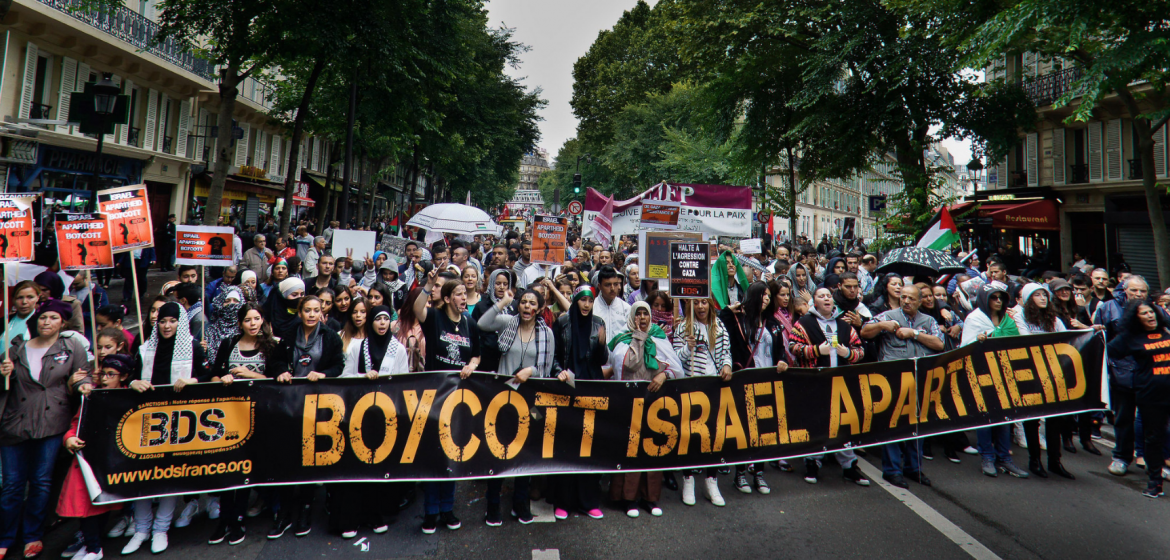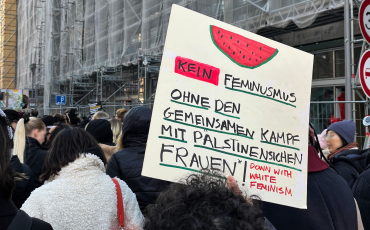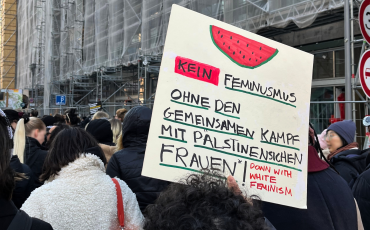Taking Palestinian Land Day as an opportunity to look back – Omar Barghouti* spoke to dis:orient about the BDS movement’s progress and obstacles in the past and also commented on the new far right wing government in Israel.
Let’s start at the beginning: What was the political context in which the BDS movement was founded?
The Boycott, Divestment, Sanctions movement (BDS) was founded in 2005, a year after the decision by the International Court of Justice to condemn Israel’s wall in the occupied Palestinian territory as illegal and the utter failure of the international community, under US-European hegemony, to act towards dismantling the wall. Palestinians consequently felt that they could not rely on governments that are deeply complicit in Israel’s regime of occupation, settler-colonialism and apartheid.
BDS was further inspired by the South African anti-apartheid struggle and the US Civil Rights movement, and was launched by the broadest coalition in Palestinian society as a nonviolent, anti-racist movement. It calls for ending Israel’s 1967 occupation, upholding the right of Palestinian refugees to return to their lands, and ending Israel’s institutionalized and legalized system of racial domination. This system of domination meets the UN definition of apartheid, as recently acknowledged by Amnesty International, Human Rights Watch as well as Israel’s leading human rights organization B’Tselem, and two former Israeli ambassadors to South Africa.
The near consensus behind BDS in Palestinian society is premised on the strong belief that popular resistance across historic Palestine, coupled with strategic, intersectional grassroots and civil society mobilization worldwide, can tip the balance of power in our struggle for freedom, justice and equality. With the current Israeli government, accurately described even by Israeli establishment figures as the state’s most far-right, racist, fundamentalist, sexist and homophobic ever, BDS is already witnessing unprecedented opportunities to grow support worldwide.
How is the BDS movement connected to well-established political forces in Palestine?
The global BDS movement is led by the BDS National Committee (BNC), the largest coalition in Palestinian society. It includes the coalition of all main Palestinian political parties. However, the BNC has never included any single political party as a member. This is intended to safeguard the BDS movement’s autonomy and security.
Additionally, the BDS movement does not adhere to any political or ideological agenda and does not take a position on the ultimate political outcome whether a one state or two states solution. No matter what solution the Palestinian people determine in exercising the inalienable right to self-determination, it must accommodate the basic rights of all Palestinians, as stipulated in international law.
In a historic development, the Anti-Apartheid Department of the Palestine Liberation Organization (PLO), in partnership with BDS, the Palestinian NGO Network, the Palestinian Ministry of Justice and the Palestinian Human Rights Organizations Council (PHROC), have recently issued a joint call for boycotts, divestment and sanctions to dismantle the system of apartheid and settler-colonialism.
What makes BDS an especially useful political tool to combat the status quo?
Israel has for years recognized the uniquely “strategic” impact of the BDS movement and has fought it accordingly with its massive propaganda machine, its intelligence services, and its legal warfare apparatus, as revealed by the Israeli government and lobby groups in the West.
The fact that Israel today is ruled by its most far-right government ever presents a serious challenge to our struggle for our rights. But it also opens up new, unprecedented opportunities for large intersectional alliances and for advancing our nonviolent struggle for comprehensive Palestinian rights. Having the Israeli finance minister, Bezalel Smotrich, proudly presenting himself as a “fascist homophobe” can only further unmask Israel’s regime of colonial oppression against Indigenous Palestinians.
What are in your eyes the greatest successes of the movement?
The greatest success of the global BDS movement is directly and indirectly evident in the impressive growth of support not just for Palestinian rights but also for ending international complicity in Israel’s regime of occupation, settler-colonialism and apartheid. A core element in this is that the BDS movement has played the most decisive role in mainstreaming the apartheid analysis of Israel’s regime of oppression worldwide.
As far back as 2018, calls for imposing lawful, targeted sanctions on Israel have become much more mainstream, even in the US. Major TV network personalities, including HBO’s John Oliver; music icons, like John Legend and Snoop Dogg; star athletes in the leading football clubs in the UK, particularly athletes of color; and Hollywood celebrities, like John Cusack and Natalie Portman, have all expressed solidarity, some of them tweeting the famous disappearing map of Palestine. Statements in support of Palestinian rights have been endorsed by more than 300 academic departments, programs, centers, unions and societies and garnered 15,000 signatures from scholars, researchers, students and university staff worldwide. Support from global LGBTQI+ communities has also grown tremendously.
A 2021 YouGov poll showed that Israel's favourability had dropped sharply among European publics too, including in France and even Germany. Just weeks ago, in February 2023, the mayor of Barcelona, Catalonia, suspended all institutional links with Israel, including the twinning agreement with the city of Tel Aviv, to protest Israeli apartheid. The city of Dublin in 2018 became the first European capital to adopt BDS.
Economically, the BDS impact can be seen in massive sovereign funds from Norway, Luxembourg, the Netherlands, and New Zealand divesting from Israeli or international companies and banks that are implicated in Israel’s occupation. Likewise, large Protestant churches, particularly in the US, have also divested from them. BDS has won the endorsement of major international workers’ and farmers’ unions federations in South Africa, Latin America, India, Europe, Canada, the United States and others, representing tens of millions of workers.
Furthermore, BDS campaigns have forced the large French company Veolia to abandon its illegal Israeli projects after losing over $20 billion in tenders worldwide over a seven year period. Other complicit companies, such as Heidelberg Cement and Caterpillar, suffered various levels of reputational damage, divestments, or loss of tenders due to BDS campaigning. The companies included in the UN database of companies implicated in Israel’s illegal settlement enterprise have also started to feel the heat.
Israel’s televised atrocities in Gaza, Jerusalem and elsewhere played the key role in this erosion of popular support for Israel, for sure, but BDS helped shape the discourse and channel this growing outrage into support for ending collusion with Israel’s regime of oppression. Large impact came also from the Black Lives Matter movement. In particular, it has opened the doors for ours and many other justice movements to be heard, to be represented, to speak for ourselves, instead of being analyzed, essentialized and our voices colonized by others. With the latest “pogrom” in the Palestinian town of Huwara beginning of 2023 this dynamic is likely to continue.
On the other hand, what would you say are its greatest failures?
I think the most important “failure,” or what we consider as a largely unavoidable mistake, is the movement’s slow start in the Arab world. This is due to our wrong assumption that, given the centrality of the question of Palestine to the absolute majority of people in WANA (West Asia and North Africa), regardless of ethnicity and religion, BDS campaigns would spread naturally, without much effort from our side.
Our first assumption remains accurate, despite the Abraham Accords between Israel and some Arab dictatorships. The most authoritative Arab public opinion survey in 2022 shows that 76 percent of Arabs consider Palestine the Arab peoples’ main cause, while 74 percent consider Israel to be the biggest threat to the region’s security and stability.
Our initial conclusion was wrong, though. Emotional, even visceral, support for Palestinian liberation in WANA has not automatically translated into strategic campaigning to end complicity in Israel’s regime of oppression for various reasons.
First, several Arab dictatorships – like the UAE, Morocco, Sudan, Bahrain and to an extent Saudi Arabia – have openly betrayed the Palestinian cause, making it much more difficult for BDS campaigns to grow in civil society. Second, the BDS movement was late in realizing that even in the Arab context, our global intersectional approach is still needed, connecting Palestinian liberation with domestic struggles for freedom, democracy as well as social and economic justice. Third, long-term strategic campaigning is not as common in the culture of struggle in WANA as it is in the US, South Africa, or the UK.
BDS consists of three strategies (Boycotts, Divestment, Sanctions). Which part has "worked best"?
BDS adopts the operational principle of context sensitivity. This means that BDS campaigns should adapt to local conditions, while adhering to the main nonviolent, anti-racist principles of the movement. While divestment has been the main feature of BDS in the US, for instance, academic, cultural and consumer boycotts have been more popular in Europe and the “Global South”. The “S” in BDS comes last by design. We’ve learned from the South African experience that only by building enough grassroots and civil society power is it possible to challenge policy makers and make them change policies towards Palestinian rights.
We are already seeing an impressive growth in support for lawful, targeted sanctions against Israel. The response in the “Global South” to this call has been unprecedented, with ten former presidents of Latin American countries and South Africa and hundreds of parliamentarians and civil society leaders endorsing the Palestinian call for a military embargo, a United Nations investigation of Israeli apartheid, and prosecution of Israeli war criminals at the International Criminal Court at the Hague, among other demands. The parliaments of the Netherlands, Belgium and Chile have also threatened Israel with sanctions if it were to go ahead with de jure annexation.
Who and what are the greatest obstacles for the BDS Movement?
Since 2014, Israel has been fighting BDS as a “strategic threat” to its entire system of apartheid and colonial oppression. A full Israeli government ministry with large budgets, the Ministry of Strategic Affairs, has led Israel’s “war” on BDS for several years, working very closely with anti-Palestinian, right and far-right Israel lobby groups across the world to undermine the movement.
This has meant that, while BDS has grown tremendously at the grassroots and civil society level, most Western governments, as well as far-right, authoritarian and xenophobic regimes around the world remained strongly supportive of Israeli apartheid. In fact, Israel has become a role model for far-right, xenophobic, or authoritarian leaders across the world, many of which are openly antisemitic, causing its popularity to decline worldwide, including among Jewish millennials, and boosting support for BDS.
How do you perceive the way BDS is portrayed in Germany?
In the GG 5.3 Weltoffenheit initiative, leading cultural institutions and cultural figures in Germany have warned that the Bundestag’s draconian anti-BDS, anti-Palestinian decision from 2019, has severely limited freedom of speech and artistic expression.
There is genuine concern about Germany’s decent into racist, anti-democratic repression, suppression of freedom of expression, and a measure of authoritarianism that may undermine the rule of law. This concern is not only expressed by Palestinians and supporters of Palestinian rights in Germany – mostly progressive, people of color and Jewish activists – but also by Germany’s cultural elite, United Nations officials, and hundreds of artists and cultural figures. Even a Bundestag expert advisory committee said that, if the 2019 anti-BDS declaration were passed into law, it would be unconstitutional and in violation of freedom of expression.
These voices have in fact followed the lead of more than 240 Jewish and Israeli scholars who condemned in strong language the Bundestag’s anti-BDS repression, defending the right to call for BDS against Israel to achieve Palestinian rights, and warned against conflating opposition to Israel’s system of oppression on the one hand and anti-Jewish racism on the other. This last point was also made by more than 40 progressive Jewish groups worldwide who play a significant role in exposing Israel’s regime of oppression and advocating for its isolation.
In 2020, the European Court of Human Rights ruled unanimously that France’s 2015 conviction of BDS activists violated article 10 (freedom of expression) of the European Convention on Human Rights. This confirmed a 2016 EU position upholding the right to advocate for Palestinian rights through BDS. Several German courts, including a Bavarian court, have reached similar decisions, overturning repressive anti-BDS policies by German city councils.
Three steady features of German anti-Palestinian racism are first, persistent misinformation; second, selective ignorance; and third, a total disregard for the voices of people of color in general and Arab/Palestinian voices in particular. Hundreds of prominent international artists, academics, authors and others have condemned, when international artists and academics, mostly Black or brown, were disinvited to festivals and events due to their support for BDS.
BDS is anchored in the Universal Declaration of Human Rights, and it has therefore consistently and categorically opposed all forms of racism and discrimination, including anti-Black and anti-Indigenous racism, sexism, homo- and trans- phobia, Islamophobia and Antisemitism. The BDS movement targets complicity, not identity. It is important in this context to note that the BDS movement, including the academic and cultural boycott of Israel, targets institutions, not individuals.
Looking back on 17 years of activism: Please characterize the different phases and conclude whether you consider the path a success story.
The recent sharp rise in global support for Palestinian rights and for the BDS movement’s nonviolent, anti-racist tactics in particular shows that progressives worldwide can help in dismantling Israel’s regime of military occupation, settler-colonialism and apartheid, as they had contributed to ending South African apartheid.
Despite the excruciating pain, loss, dispossession, denial of basic rights, and dehumanization that Palestinians experience every day at the hands of this far-right Israeli regime and its anti-Palestinian supporters in the US, Germany, France, UK, and elsewhere, we remain hopeful. We are witnessing a seismic shift in public opinion against Israeli apartheid and in support of our campaigns. It is only a matter of time when we reach a tipping point and then realize our aspirations of freedom, justice and equality.
*Omar Barghouti is a Palestinian human rights defender and co-founder of the Boycott, Divestment and Sanctions (BDS) movement for Palestinian rights. He is a co-recipient of the Gandhi Peace Award in 2017.




















